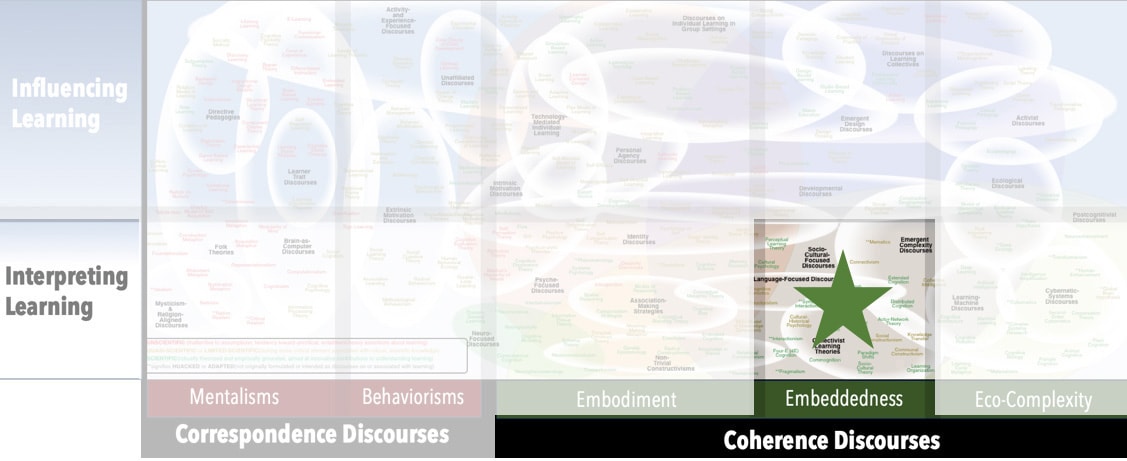Focus
Co-construction of social realityPrincipal Metaphors
- Knowledge is … social constructs (the meaning of an object or event by a community)
- Knowing is … co-enacting a reality; acting appropriately
- Learner is … co-constituted reality
- Learning is … participating (in the construction of a social reality)
- Teaching is … co-participating
Originated
1960sSynopsis
Social Constructionism is based on the assertion that meanings are developed with others. The theory is focused on social constructs – that is, shared assumptions and jointly construed understandings of such notions as “money,” “atoms,” “common sense,” “self-concept,” and “reality.” The theory is often used to account for dramatically different worldviews across societies and eras. Importantly, Social Constructionism does not deny a non-human reality; it merely asserts that human understandings of any sort of reality are socially mediated and jointly construed – and so multiple realities are possible (and sometimes compete). In Social Constructionism, shared language is seen as principal means of constituting reality – in explicit contrast to the assumption of most Correspondence Discourses that language mirrors reality. Associated constructs and discourses include:- Consensus Reality – those constructs that members of a group or culture agree on – that is, that are believed to be (or, at least, treated as) real by a collective. Persons disagreeing with these constructs are thus viewed as occupying a different reality, living on a different planet, and/or delusional.
- Epochalism (Clifford Geertz, 1970s) – the conviction that eras of human history are so unique– that is, they revolve around such distinct social constructions – that they cannot be compared or analyzed for insights or guidance on current circumstances
- Social Construction of Technology (Technological Constructivism) Trevor Pinch, Bijker Wiebe, 1980s) – a Social Constructionist perspective on technology founded on the premise that human activity and intention shapes technology, not the other way around (contrast: Technological Determinism, under Determinisms)
Commentary
The most common criticisms of Social Constructionism revolve around a perceived diminishment, denial, and/or ignorance of the influence of biology on human thought and action. This concern has recently been amplified by Cognitive Science research, which some argue presents evidence that major aspects of humans’ shared realities are better interpreted as biologically rooted. In another vein, Social Constructionism is often criticized as being culturally relativistic, and elements of it are frequently used to close down debates on competing social constructs from different societies, religions, and cultural subgroups.Authors and/or Prominent Influences
Peter L. Berger; Thomas LuckmannStatus as a Theory of Learning
While it was not classified as such by its original authors, Social Constructionism is commonly identified as a theory of learning among educational researchers. Insofar as learning is understood as participation in the production of new insight, this interpretation is reasonable.Status as a Theory of Teaching
Social Constructionism is not a theory of teaching. Over the past few decades, the theory has been regularly invoked to justify classroom structures that focus on group process, but leading proponents of the theory typically see such applications as misreadings. Teaching emphases associated with Critical Pedagogy are perhaps more reflective of Social Constructionism’s core principles.Status as a Scientific Theory
Social Constructivism is associated with broad programs of research – which, for the most part, are undertaken outside of education. Within education, theorists often assert the perspective to be viable and robust, based on that external body of research.Subdiscourses:
- Consensus Reality
- Epochalism
- Social Construction of Technology (Technological Constructivism)
Map Location

Please cite this article as:
Davis, B., & Francis, K. (2023). “Social Constructionism” in Discourses on Learning in Education. https://learningdiscourses.com.
⇦ Back to Map
⇦ Back to List
